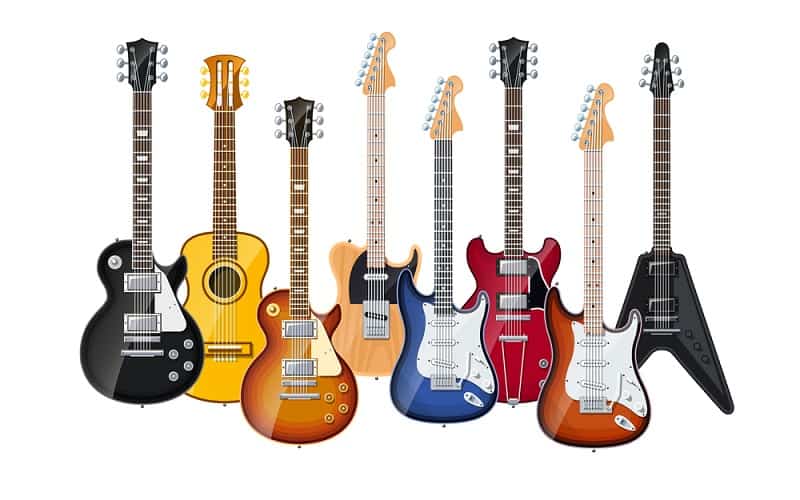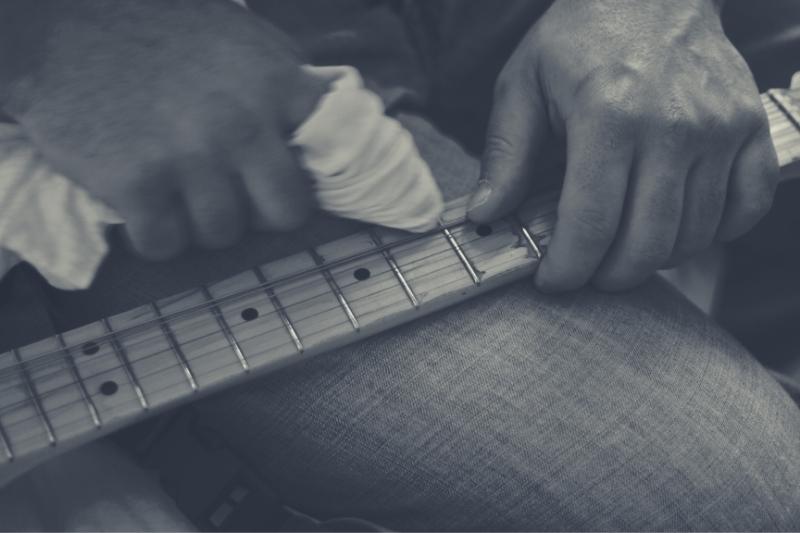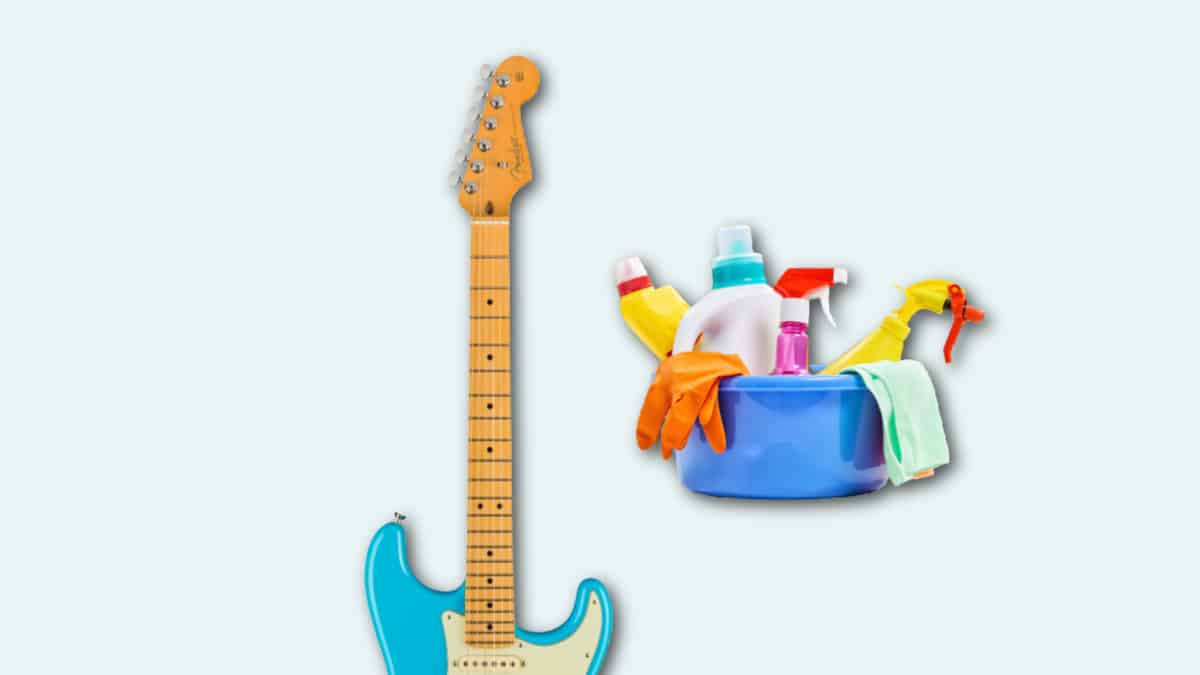Being a guitarist can be an expensive hobby!
At least for me, my first entry-level guitar soon turned into an acoustic guitar, an electric guitar, a nice amp, a pedal or two, and many other accessories.
But one thing I didn’t think about in the beginning was cleaning and maintenance.
By the time I realized I needed to clean my guitar, I didn’t have extra cash for fancy guitar-cleaning stuff.
I had no choice but to learn how to clean a guitar fretboard with household items.
The good news is that it can be done! Today I’ll give some tips, tricks, and information on what’s safe to use on your guitar and what’s not.
How to Clean an Acoustic Guitar Fretboard
The body of the guitar tends to get finger marks on it as you pick it up and put it down while playing.
But the part that really gets the dirtiest is the fretboard. Think about it – your fingers are on it constantly, sliding up and down.
This is true for an acoustic guitar and an electric guitar. You’re not only transferring any dirt that was on your fingers to the fretboard, but you’re leaving oil from your skin there too.
If you’ve never cleaned your fretboard before, consider trying it next time you restring.
I can guarantee, you’ll feel the difference almost immediately!
Here are some tips for preparing to clean your fretboard.
- Remove the strings
- Dust the fretboard off
- Lay your guitar down somewhere safe
If your guitar has a floating tremolo bridge, like a Floyd Rose, removing all the strings at once may not be the best idea.
On these guitars, the bridge is held in place by the tension of the strings. If you remove them all, the bridge could collapse, making it harder to get your action right again.
If you have a guitar with a normal bridge, then you don’t have to worry!
Does The Type of Wood Matter?
Not all fretboards are the same. There are three main wood types that are common on fretboards, and the type of wood can make a difference when it comes to cleaning options.

Rosewood
Rosewood is the most common wood for a fingerboard to be made of. Indian Rosewood is what’s usually used, and it has a rich, dark brown color. It contributes to a warm guitar tone.
Usually rosewood is left unfinished, meaning it doesn’t have a layer of lacquer on top of it. Rosewood has natural oils in it, so it doesn’t need to be finished.
Ebony
African and Asian Ebony is also a popular choice, and like Rosewood, can be left unfinished. It’s darker than Rosewood, near black, and has a clean, smooth, balanced sound.
Maple
Manufacturers really like maple these days. It’s a sustainable choice, widely available, and very resilient.
Unlike the other two, it’s a lighter-colored wood, and can be almost yellow.
Because maple doesn’t have as much natural oil in it as Rosewood or Ebony, it needs to be finished with a layer of lacquer to prevent it becoming damaged or warping.
A maple fretboard contributes to a bright sound.
Other Wood Types
While the above three are the most popular and common, you may also find fingerboards made of:
- Walnut
- Indian Laurel
- Ovangkol
- Pau Ferro
- Padauk
- Richlite (synthetic)
- Rocklite (synthetic)
- Micarta (synthetic)
Why Does It Matter?
The type of fretboard you have can make a difference to what cleaning products are effective, and which ones may damage your fingerboard.
Find out what wood your fretboard is made of before you get started using household items to clean it.
If you can’t tell at a glance, do some research on the brand and model of your guitar!
Once you know, you can choose which household items would work for you.
What Can I Use to Clean My Guitar Fretboard?
It’s always a good idea to check the manufacturer’s guidelines before cleaning your fretboard.
Of course, they’re likely to suggest a fancy oil or polish, so you may need to do some extra research on what would work for your guitar.
Keep a stash of Q-tips, unperfumed baby wipes, cotton balls, and microfiber cloths handy for using with these household cleaners.
What Household Items Can I Use to Clean My Guitar?

Water
Yep! It’s freely available and contains no chemicals that could damage your guitar.
Don’t soak your guitar, obviously. You need to use it sparingly, and never put water directly onto your fretboard.
Instead, lightly dampen a microfiber cloth and use that to clean your fingerboard, fret by fret. Dry it down afterwards so there’s no moisture left on the neck.
Water is good for light cleaning, but if your guitar is really grubby, it may not be enough.
Distilled Vinegar
If you’re wondering about using vinegar to clean guitar fretboards, well, it depends on the type you use.
Distilled vinegar is acceptable if used carefully and in small quantities. Full-strength vinegar is a no!
Use it the same way you’d use water, by dabbing a bit onto a cloth or dipping a Q-tip into it and cleaning the frets. Never pour it directly onto the frets, whether it’s distilled or not.
Lemon Oil
Lemon oil is perfectly safe to use on unfinished fretboards, as it restores their natural oils while cleaning them at the same time.
Keep in mind that you only need to oil your fretboard twice a year or so. While lemon oil can clean well, you don’t want to over-oil your fingerboard, so use it sparingly.
It would be good for oiling and cleaning a rosewood fretboard, or ebony, every few months, as they’re often unfinished.
What oil can I use on my fretboard if it’s finished, I hear you ask? Well, finished fretboards don’t need oiling, so you don’t have to worry!
Make sure to double check the manufacturer’s specs, though – for example, Martin Guitars recommend that you don’t use lemon oil on their guitars.
Take note – this is not lemon juice! It’s a specially formulated lemon oil with a low concentration.
Lighter Fluid
You may be surprised to read this one, but guitarists and luthiers use lighter fluid pretty often to clean their fretboards.
Just like other household items, avoid placing it directly onto your frets. Instead, lightly dampen a microfiber cloth or cotton ball and use that to rub down your frets.
Vegetable Oil Soap
Don’t confuse this with actual vegetable oil! This is a soap, but it’s made from water, pure vegetable oil, and coconut.
Because it’s completely natural, it’s quite safe for use on wood.
It also gives the fretboard a really nice shine!
What Should I Not Use On My Fretboard?
Just because there are some great household cleaners that work well for fretboards, doesn’t mean any old thing will work!
Here are some household items that I recommend keeping far away from your guitar.
Olive Oil
You may be tempted to rub a bit of olive oil on your fretboard in a pinch, but please don’t!
Not only does it get a little slimy at first, after a while it can become sticky and just plain uncomfortable to play.
Also, because it’s essentially a food item, it can actually go bad over time, leaving a strange smell and potentially damaging your frets.
Bleach
It may be great for some things, but bleach is not a good option for cleaning a fretboard.
It may strip the dirt off, but it would also strip the color and top layer of wood. Unless you specifically want to lighten the color and thin down the neck, avoid it.
Full-Strength Vinegar
If the vinegar in your pantry isn’t distilled, keep it away from your fretboard!
It’s just too strong, and while it may actually clean quite well, the chance of it damaging your frets is high.
Acetone
While acetone is great for removing sticky residue from the guitar body, it can damage guitar frets due to its abrasiveness.
If you’re really stuck, you can use a drop of acetone distilled in water. But it’s not recommended!
Sandpaper
Sandpaper is made for… Wearing away rough wood. Using it on your fretboard is going to wear the wood away!
It may remove grime and gunk, but it will most likely remove part of your fretboard too. Avoid!
Isopropyl Alcohol/Ammonia
Household cleaners containing isopropyl alcohol or ammonia can be dangerous.
Almost all of them contain some kind of abrasive agent, which is designed to scrub away dirt and grime. The problem is, they tend to scrub away the finishes on guitars too!
Check out this video for a summary of what you can and can’t use to clean your guitar.
How to Make a Homemade Fretboard Cleaner
Once you’ve decided which of the above household items suit you, it’s as simple as using some every time you restring your guitar.
There’s really no need to clean your frets in between restringing, unless you play extremely often and never wash your hands… But in today’s times, who doesn’t wash their hands for 20 seconds 12 times a day?
Most of these household items last for ages, so I’d suggest keeping some in a small, tightly sealed bottle as part of your guitar kit.
That’s how easy it is!
Conclusion
Now that you know how to clean a guitar fretboard with household items, there’s no excuse for a grubby fingerboard ever again!
Just kidding, but it’s good to know that there are items in your home that can be used to keep your guitars both clean and smoothly playable.
Take care and make sure to do your research on your own guitar before just using one of these, though!
Thanks for reading!

